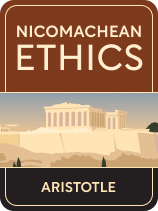

This article is an excerpt from the Shortform book guide to "Nicomachean Ethics" by Aristotle. Shortform has the world's best summaries and analyses of books you should be reading.
Like this article? Sign up for a free trial here .
What’s the goal of life? Did Aristotle get it right?
Aristotle spent a lot of time thinking about life and its ultimate goal. He considered what we do and why we do it. He concluded that a good life is a happy life—and a happy life is a good life.
Read more to better understand Aristotle’s view.
The Goal of Life
Happiness, says Aristotle, is the goal of life. He arrives at this conclusion by examining the nature of human action. Aristotle claims that the purpose of all human actions is achieving some kind of good—that is, we do things because we think they are the “right” or “best” thing to do in a given circumstance. However, these “goods” exist in a hierarchy: If the reason we do action A is so that we can then do action B, it follows that action B is better than action A—action A is just a means to an end.
For example, Lina works at a shoe store. The reason she works there is so she can pay her rent. Therefore, paying rent is a higher good for Lina than working at a shoe store.
Aristotle concludes that the top of the hierarchy of “goods” is a means that is also an end—something that we want for its own sake. This ultimate good, he argues, is happiness. Since happiness is the highest good, the reason for all action inevitably leads back to it. If you ask someone why they want to be happy, they can’t and won’t provide another, greater reason. Because happiness is the ultimate good, it follows that a good life is a happy life and vice versa.
For example, Lina wants to pay rent because she wants a place to live. She wants a place to live because it provides her with safety and shelter. She wants safety and shelter because it allows her to live a happier life. She wants a happy life for its own sake, not because it will get her something else.
(Shortform note: “Happiness” is the common translation of the Greek “eudaimonia,” though eudaimonia doesn’t perfectly match a modern conception of happiness. Instead, eudaimonia represents a sort of flourishing—a life well-lived. It’s not a temporary emotion, but rather a long-term sense of contentment or purpose.)
| Psychology and Aristotelian Happiness Modern psychological research supports the connection between doing things for their own sake and living a happy, fulfilling life. In Flow, psychologist Mihaly Csikszentmihalyi claims that a major component of happiness is “autotelic” activities: things we do for their own sake because we get some kind of enjoyment or satisfaction out of them. However, while Aristotle argues that virtuous activities like acting ethically are the only truly autotelic acts (a point that we’ll discuss later in the guide), Csikszentmihalyi argues that many different activities (chess, running, dancing, and so on) can be autotelic—as long as you enjoy that activity for its own sake. |

———End of Preview———
Like what you just read? Read the rest of the world's best book summary and analysis of Aristotle's "Nicomachean Ethics" at Shortform .
Here's what you'll find in our full Nicomachean Ethics summary :
- Aristotle's philosophies on topics such as happiness, virtue, and wisdom
- What it means to be morally virtuous and how someone can develop moral virtue
- How wisdom contributes to the possibility of a happy life






